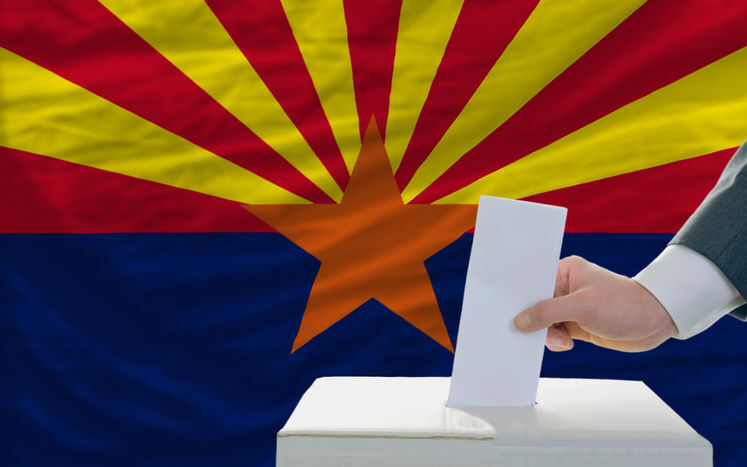PHOENIX — Republican Attorney General Mark Brnovich is apparently satisfied that no one is being cheated out of a vote by the use of Sharpies to mark ballots at polling places.
Michael Catlett, who handles election issues for Brnovich, said an extensive explanation by the Maricopa County Attorney’s Office of the use of the felt-tipped pens now convinces him there is no basis to believe ballots were left uncounted based on a “bleed-through” of ink.
So as far as he is concerned, the matter is closed.
But Catlett expressed no regret for demanding answers to a list of questions about the process and requiring county officials to respond in less than 24 hours. He said his office had received “hundreds” of complaints from concerned voters.
“While some have attempted to characterize those complaints as the product of a ‘conspiracy theory,’ it was necessary and appropriate for the Attorney General’s Office to conduct some investigation, rather than simply brushing hundreds of Arizona voters off, and to obtain information from the elected officials actually tasked with tabulating votes,” Catlett wrote in a letter to the Maricopa County Attorney’s Office.
And a spokesman for Brnovich, Ryan Anderson, said a review continues of the more than 1,000 complaints, to separate out those whose votes may have been affected versus those who wrote in saying they had heard about what has been dubbed #SharpieGate.
While Brnovich is walking away from the issue, that’s not the case for some other Republican interests, who are pushing ahead with litigation asking Maricopa County Superior Court Judge Margaret Mahoney to intercede.
There, attorney Alexander Kolodin wants a ruling that ballots that were not accepted at polling places because of bleed-through or related problems must be identified and “cured.” He wants a hearing to explore legality of the process to mark and review ballots.
But Democratic Secretary of State Katie Hobbs, in her own legal filing Thursday, told the judge there just isn’t time to give Kolodin what he wants.
She pointed out that Arizona law requires the county to approve the formal “canvass” of the votes no later than Nov. 23. That deadline, in turn, affects her office’s ability to finalize all election results for the state a week later.
So Hobbs told Mahoney if she’s going to set a hearing it needs to be no later than Monday, Nov. 9, forcing Kolodin to present whatever evidence he has at that time.
Hobbs said there’s nothing to the case, calling the claims of disenfranchisement due to the use of Sharpies “patently false.”
And Hobbs told Mahoney if she wants proof of that, all she needs to do is refer to the conclusion by the Attorney General’s Office that no one was cheated.
There are no ballots cast at polling places that have been set aside that can be run through counting equipment, said Tom Liddy, who heads the civil division of the Maricopa County Attorney’s Office.
He said if a ballot has extra or stray marks or marked more votes than allowed, then it is spit out by the tabulating machine. At that point, Liddy said, voters can “spoil” their ballot and get a new one from poll workers.
“For various reasons, some voters choose not to spoil their ballots, which is their right,” he said.
Kolodin remains unconvinced.
He said there is evidence that people were denied new ballots or that the ballots with problems, rather than being counted by machines, were set aside and sent to county offices where individuals sought to “adjudicate” the voter’s intent. But that runs afoul of the right of voters who show up at polling places to feed their ballots into the machines and verify that they are being tallied, he said.
He also wants Mahoney to order that outsiders, including people who say their Sharpie-marked ballots may have been misread, to go to county offices and watch as these ballots are fed back through machines.
Liddy said there are no such boxes of ballots waiting to be rerun and tabulated.
But Kolodin questions that assertion. “That’s why we have courts to determine what are the facts,” he said.
And Kolodin dismissed assertions that random outsiders are unnecessary and inappropriate at central tallying locations to monitor the process. Party officials have “the party’s interest at heart” and not necessarily that of any individual voter, he argued.
Liddy said the maligned Sharpies are the device recommended by the manufacturer of the scanning equipment. That’s because they have quick-drying ink.
By contrast, he said, the ink in some ball-point pens stays wet as the ballot is being fed through the scanner. That “can cause smudges in the machine and foul them, while Sharpie markers do not.”
Liddy also told Catlett, as well as the judge, that even if there is a bleed-through, it doesn’t matter. The ovals on the back side of the ballot are offset from those on the front. So even ink that goes through to the other side would not affect any votes, he said.





